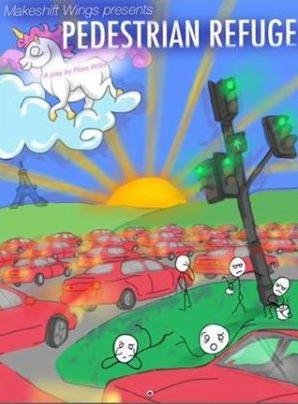Artistic director at Makeshift Wings, Amy Bethan Evans, has taken it upon herself to help give a voice to new writers who, like herself, find that the portals into public theatre space are well guarded by gatekeepers who seem to find playwrights a bit of a nuisance. Very few theatres or production houses will countenance an ‘unsolicited script’. The handful that do (notably the NT, the Royal Court and Hampstead) will often have some kind of agenda to help narrow down the plays that could see the life giving chance of production. So all praise to Amy and the good folk at the Bristol Bierkeller who have provided the stage for emerging talent in Bristol.
To be fair to Ross Willis, his play (in small part devised by the cast) is billed as work in progress so any response to the work should have that caveat in mind. His plot would be at home in any list of absurdist writings: a disparate group of people become marooned on a traffic island for four years. During that time there is a burgeoning love story between disinterested Meg (Emily-Jayne Baker) and persistent suitor, Henry (David Cole), a murder and a bid for dictatorship. The island becomes a prison, but when the traffic finally stops there is uncertainty as to what to do.
The play starts well enough with some Pythonesque exchanges between the new ‘refugees’ who each give a little account of themselves and which seem to suggest we are heading for a one act extended comedy sketch. The play then morphs into an existentialist moan about the meaning of life, throwing up questions like ‘why are we here’ and ‘what should we do with our freedom’ with diversions into the power of imagination and a couple of clichés about Paris for good measure. It then takes a turn to the dark as tissue salesman, John, makes a bid to become supreme ruler.
With so many kites flying the audience could do with a little help from the director who needs to stamp a little more authority on proceedings. Henry’s line, ‘I can’t do politics, I’m far too honest’ got a bit lost and so went for nowt. By the time John asks Henry ‘Why are you here?’, the play seemed to have lost its way a little.
It’s usually a good sign of a play being under-rehearsed when actors are vague in their movements, do a lot of unnecessary waving of arms and lack focus and clarity. That said, we did see the beginnings of some potentially interesting characters. Fred Arnot’s breezily despotic John could easily be the subject of more detailed treatment, as could Charlie Elliot’s faith-losing Christian. On the other hand Catherine Guy’s nicely observed busybody seemed to have lost her point after the initial absurdities.
Pedestrian Refuge has the feel of a number of good ideas, which are not currently cohering into a whole. It’s an ambitious piece for a first full-length play and suffers from trying to take on too much. Some selection would be beneficial, parking one or two things for another play and concentrating on one or possibly two threads. Ross Willis has set out his stall, displaying some of the things he’d like to write about, but needs to resist the temptation to try and sell them all in one go. If, on top of that, director, David Lewis, can help bring everything into focus, Pedestrian Refuge could well be worth taking to the next stage. ★★☆☆☆ Graham Wyles


